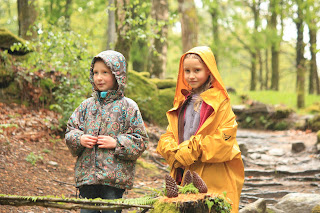It's certainly something we also worry about every so often, usually when we're worrying about our home education choice full stop. And it's definitely something we were concerned about when we moved out of Paris with its large and lively home schooling community to rural Brittany. Would there be enough opportunities for them to meet people? Would they make friends?
In fact, our children have very healthy social lives. They have a lot of friends of all different ages and from many different backgrounds. They meet other homeschoolers of varying ages at their weekly science club and when we arrange to do things together socially. They also meet a lot of school educated children at their various activities; climbing, pony, karate. And they socialise with adults too.
 |
| Land Art with a village friend |
I've thought a lot about the idea of spending most of your time with people the same age and I can't say I think it's ideal. I understand that for schooling it's probably one of the most practical ways to organise students, but I can't help thinking it means lumping together a group of people who are to similar in age and experience and therefore can't perhaps be much help to each other in terms of growth and development. Being with those who are older than us allows us to share their experience, to learn from them. Being with those who are younger than us encourages our caring side, calls on us to act responsibly and does wonders for our ego when it shows us both how far we've come and how someone younger than us looks up to us. Both Montessori and John Holt have written on this subject.
In our own family I can clearly see both these effects in our eldest, Maya's experience. We take a sculpture class together which is really for adults as it's on a school day within school hours. She loves it, loves being with these adults some of whom have special needs, some of whom are retired and others who work. She's totally accepted by the group and plays an active part in the discussions which rage during our workshop, discussions about pottery, family, work and politics. Participating in this class requires her to be mature and focused. It allows her to hear about many things she wouldn't hear discussed otherwise. It's also given her a group of female role models who have all grown attached to her and encourage her in her artistic and personal life.
On the other side of the scale, as part of her pony club experience she often helps the younger children to prepare their ponies and also leads ponies for younger children who are nervous or scared. This really brings out the caring side of her nature and it's great to hear her talk about how much she likes doing this, like today when she came home elated that a young girl she's been helping finally managed to gallop on her pony all by herself.
I guess my conclusion would be that life offers us many opportunities to build a varied and nourishing social life. Yes, school may force us to confront people from different backgrounds and find a way to share a space, but life does too! So if this is your main concern about home educating - don't let it stand in your way.
 |
| Hairdressing with Yael |

























